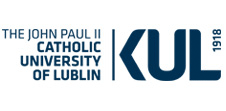Principles
The Abraham J. Heschel Center for Catholic-Jewish Relations is a scientific and educational unit of the John Paul II Catholic University of Lublin. Established by Rev. Prof. Miroslaw Kalinowski, Rector of the Catholic University of Lublin (KUL), the Center officially launched on October 17, 2022.
The Center's mission is to build Catholic-Jewish relations on the scientific, educational, and cultural levels internationally.
Pillars: A Common Bible - A Common Past - A Common Future.
The pillars on which the Center's activities are based relate to common biblical roots, to the community of the history of both societies, as well as to the need to shape a future based on dialogue and openness to multiculturalism.
Patron: Abraham J. Heschel
The Center's patron is Rabbi Professor Abraham Joshua Heschel (1907-1972), a prominent theologian, philosopher, rabbi and poet. He played a particularly important role during the Second Vatican Council, influencing the formulation of the Nostra Aetate document, which stands as a turning point in Catholic-Jewish relations.
Directions of action: Science - Education - Culture
The Center's three directions of action - science, education and culture - open up opportunities to reliably address a wide range of matters. The environment of the Catholic University of Lublin provides not only professional scientific staff, but also the opportunity to engage young people, which is key to the project. The project combines research work, commemorating the past, educating and engaging young people, as well as shaping public awareness through modern media on a global scale.
The Center's research activities are focused on themes of Jewish history, culture, and heritage, primarily in Polish lands but also in Europe, Israel and the world. The subject of research will be the mutual relations of the Jewish and Catholic communities, their coexistence over the centuries. The aim is to comprehensively address the issue of mutual Polish-Jewish relations and common cultural heritage. Among others, the Center's tasks include
- scientific research,
- documentation and archival research,
- creation of databases,
- preparation of publications of research papers, source publications, lexicons, publications of popularization and others,
- development of biographies of individuals and families who selflessly rescued people of other nationalities during the period of totalitarian regimes of the 20th century,
- organizing scientific conferences, forums, meetings, and discussions on selected issues in the area of research.
Educational activities are aimed at forming mature civic attitudes, especially among young people; developing interreligious and international dialogue. Among the assumed forms of activity are
- a program of visiting professors and external lecturers for classes at the Catholic University of Lublin (KUL)
- a student exchange program between the Catholic University of Lublin and universities in Israel,
- joint projects commemorating the lives and martyrdom of Jewish and Polish nationals, involving young people from Poland and Israel,
- organization of a seminar for school teachers in Poland,
- organizing student and professional internships,
- teaching Hebrew and Yiddish.
An important aspect of the Center's activities is media public education - disseminating knowledge and shaping public awareness through regular media publications on the results of research and events related to the Center's activities.
The Center's cultural activities are designed to bring Jewish culture closer, as well as the intertwining of Jewish, Polish and European cultures through, among others by:
- presentations of documentary and feature films on Jewish and Israeli themes,
- meetings with writers and cultural artists, journalists, prominent historians and researchers in other fields,
- organizing exhibitions combined with lectures to show various aspects of Jewish culture, common history and martyrology,
- co-organizing anniversary ceremonies commemorating victims of totalitarianism;
- cooperation with other institutions and organizations in caring for memorials, cemeteries, architectural monuments,
- use of modern media in the presentation of Jewish culture and its links with Polish and European culture.












